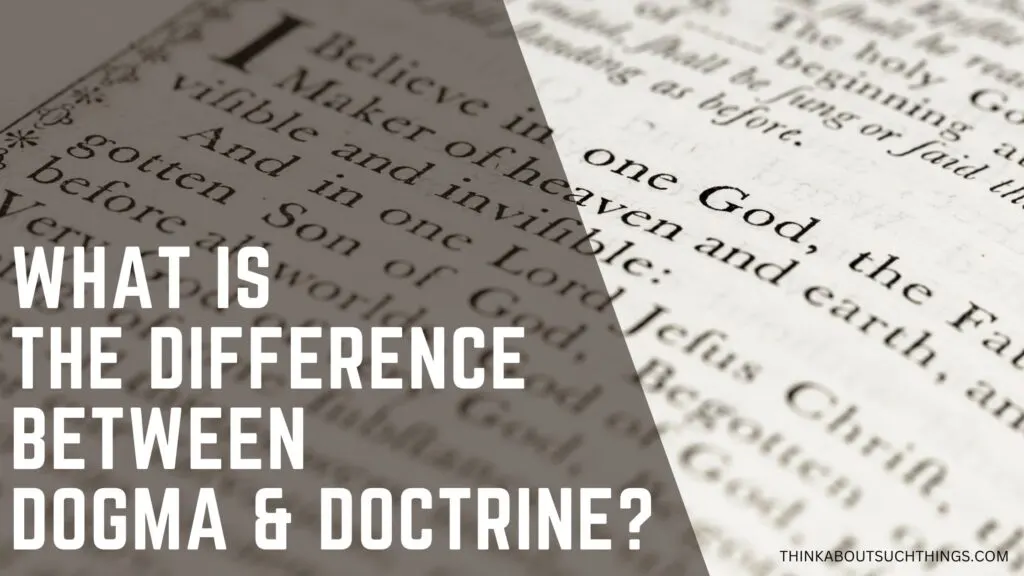In this article, we will look at what Christian Dogma is and how it differs from Christian Doctrine. So, let’s dig in and learn…
The Church has a long and colorful history full of arguments and splits between groups. These differences have been going on since the New Testament, as Peter and Paul couldn’t agree on many aspects of the faith. Everyone has their viewpoint and opinion. Most of these arguments are based on dogma and doctrine.
In our modern world, most Christians are familiar with the word doctrine, but dogma not so much.
This begs the question, is dogma a good thing? What is dogma in the first place, and is it different from doctrine in any way? I know I have had these questions!
So, let’s look at Christian dogma, its meaning and purpose, and how it differs from doctrine.

What Is Christian Dogma?
The word “dogmatic” originates from the Greek word “dogmatikos,” which means teaching, doctrine, or principle (source). And in the etymology, we see an even deeper view of how this word has been used:
dogma (n.) “a settled opinion, a principle held as being firmly established,” c. 1600 (in plural dogmata), from Latin dogma “philosophical tenet,” from Greek dogma (genitive dogmatos) “opinion, tenet,” literally “that which one thinks is true,” from dokein “to seem good, think” (from PIE root *dek- “to take, accept”). Regarded in 17c.-18c. as a Greek word in English but subsequently nativized. also from c. 1600
We also see the word dogma used in the New Testament. It is usually translated as decree or ordinance. Here is what the Strong’s Concordance has to say:
δόγμα dógma, dog’-mah; from the base of G1380; a law (civil, ceremonial or ecclesiastical):—decree, ordinance.
Outline of Biblical Usage:
- doctrine, decree, ordinance
- of public decrees
- of the Roman Senate
- of rulers
- the rules and requirements of the law of Moses; carrying a suggestion of severity and of threatened judgment
- of certain decrees of the apostles relative to right living
Here is a list of verses that use the word dogma:
- Luke 2:1
- Acts 16:4
- Acts 17:7
- Ephesians 2:15
- Colossians 2:14
In the modern Church, “principle” is the closest definition of the word. It loosely refers to a set of Christian teachings or principles considered perfectly authoritative and unchangeable.
It is whatever we believe that has been divinely revealed.
Dogma can refer to various concepts, such as the nature of God, the divinity of Jesus, the Trinity, and salvation. These beliefs stem from a direct Biblical statement or an intensive study of the scriptures (in context) under the guidance of the Holy Spirit.
In other words, Christian dogma can be described as the principles you must believe to be seen as a Christian. It is a point that is not up for negotiation in any way.
This should be simple, but it’s not; some groups are seen as Christians and call themselves that, but they don’t hold some of the dogmas others have.
Christian dogma is a slightly controversial topic lately. For many centuries, starting in the Middle Ages with the Catholic Church, people accepted the statements made by the Church without question.
Every part of the dogma was taken at face value, and some groups considered it sinful to question them, even out of curiosity or honest desire to understand.
This trend continues today, but it is perhaps less pronounced – some churches welcome questions about dogma, and preachers are more than willing to put in the time to explain the finer details.
This is not bad; we should be free to question a church’s belief statements to determine if they’re Biblical. I don’t think people do it enough, and because of that, they can fall into what looks like a Christian church but in reality, is not. A prime example would be Mormonism.
On the other hand, modernism has led to many people rejecting dogma entirely. Even some who claim to be Christians don’t understand many of the Church’s statements, while others completely reject them, like the existence of heaven and hell.
This is a dangerous and humanistic trend since any belief system should be based on the foundation of unshakeable truth.
Religious Dogma In The Bible
Religious Dogma has been a central part of the Bible almost from the start. Jewish religious practices involve plenty of dogma. The Ten Commandments can be seen as the foundation of Jewish belief, and it has become dogma for religious Jews.
Jesus challenged much of that dogma when it became a fruitless ritual, such as the law regarding the Sabbath.
For believers, the most crucial dogma surrounds the life, being, and ministry of Jesus.
Since we can see dogma as a type of authoritative statement, Jesus’ teachings were the perfect example.
Matthew 7:29 says that Jesus taught “with authority,” and He imparted His authority to His disciples (apostles) when He sent them forth to preach in Matthew 28:18-20.
Galatians 2:11-14 tells us how Paul and Peter argued indirectly over a principle of dogma. From Peter’s actions, it’s apparent that he still hadn’t made peace with the fact that Jewish dogma did not apply to gentile believers, which Paul directly challenged him about.
11 When Cephas came to Antioch, I opposed him to his face, because he stood condemned. 12 For before certain men came from James, he used to eat with the Gentiles. But when they arrived, he began to draw back and separate himself from the Gentiles because he was afraid of those who belonged to the circumcision group. 13 The other Jews joined him in his hypocrisy, so that by their hypocrisy even Barnabas was led astray.
14 When I saw that they were not acting in line with the truth of the gospel, I said to Cephas in front of them all, “You are a Jew, yet you live like a Gentile and not like a Jew. How is it, then, that you force Gentiles to follow Jewish customs? – Galatians 2:11-14
Another piece of Jewish dogma that caused plenty of controversy in the early Church was the question of circumcision.
Many believers expected gentile believers to be circumcised, but Paul insisted that circumcision is a spiritual aspect and not physical (Romans 2:25-29).
For modern believers, the affirmation of Jesus’ divinity and His sacrificial death and resurrection are considered the central dogmas of the Christian faith.
What Are The Criteria For Christian Dogma?

Christian dogmas are not formulated casually but are established through a careful process that involves scriptural examination, theological reflection, and the guidance of the Holy Spirit.
The criteria for the recognition of dogma include the following:
Scriptural Basis
Dogmas must find their roots in the Holy Scriptures (the Bible), explicitly or implicitly.
All interpretations must be made within the context of the chapter, book, and the Bible as a whole before it can be accepted as infallible truth.
The Bible is the primary source from which divine revelation is derived and authenticated.
Universal Consent
Dogmas should be affirmed by the consensus of the Church, representing the agreement of the faithful across different geographical locations and historical periods.
This ensures the continuity and unity of the Christian tradition.
Any Christian who appears with a “new” dogma based on a radical revelation should be approached carefully..
It doesn’t mean they are wrong (Martin Luther challenged all the accepted dogma of his time), but it should be studied and approved by those who are wise, filled with the Holy Spirit, and who know the scriptures.
Another area we need to be careful with is how political and cultural influences try to add, change, or force Christian dogma to suit their agenda. We follow the Word of God, not the ways of man!
Apostolic Tradition
Dogmas often trace their origins to the apostles’ teachings, who directly witnessed Christ’s life, death, and resurrection.
The apostolic tradition plays a crucial role in validating and safeguarding the core beliefs of Christianity.
Magisterial Authority
Dogmas are proclaimed and ratified by the Church’s highest authority, such as ecumenical councils or papal decrees. These pronouncements serve as definitive statements guiding the faithful in faith and practice.
All these requirements aim to ensure that our beliefs remain pure. Unfortunately, that does not always happen – especially in cases where one person or a small council of people have all the say about dogma.
You should approach them carefully and study every statement within the context of the entire Bible.
However, most uncertainties and false teachings do not often arise from dogma; most stem from doctrine.
Dogma Vs Doctrine: What is the Difference?

People often use the terms dogma and doctrine interchangeably, but the two concepts are entirely different and it’s good to know and understand why.
Dogma
As we’ve seen, dogma refers to the unshakeable and infallible truths that are universally accepted within the Church.
These are seen as divinely-revealed concepts like the nature of God, Christ’s divinity, His death and resurrection, and our salvation that comes forth from His sacrifice.
Most Christian churches hold fast to at least these basic concepts and many others.
Doctrine
Doctrines are teachings or principles that flow from the dogma of the Church but that aren’t necessarily considered infallible.
As believers grow in their faith and learn to understand more about God and the Bible, our doctrines can change, which has happened often over the centuries.
For example, on the surface, there are many differences between denominations like the more traditional reformed churches and the Pentecostal or charismatic churches.
However, when you look at their dogma, the groups mostly believe the same things: God’s eternal and all-powerful nature, the Trinity, and the sacrifice of Jesus Christ as the only basis for salvation. This makes them all Christian.
Below the surface, though, there are many differences, including baptism, communion, styles of worship, preaching methods, and even types of prayers.
These are all doctrines; they have changed based on someone getting a new revelation that does not contradict the central dogma of the Church.
Should We Question Dogma And Doctrine?
This is a sensitive topic, but believers should test everything that a preacher or authority figure says at the hand of the Bible because false prophets and teachers abound (1 John 4). To top it off, we now have to battle social media, which spouts out all kinds of information.
However, remember that the Church’s fundamental dogma, like the Apostles Creed has been tested for centuries and passed along from the apostles themselves. Questioning these statements should be a matter of finding them in the scriptures to stir your faith rather than trying to disprove them.
Doctrine is a different matter in many cases. Since most doctrines are not considered infallible, we may question the doctrines of any church and find proof in the Bible. If we find that any doctrinal statement cannot be explicitly proven (in context), we should seek to find the truth.
Don’t take everything a preacher, teacher, influencer, or whom ever says at face value, but test it according to the Bible, because that’s where we find the infallible Word of God, and anything that contradicts it is not the ultimate truth.
To sum things up, remember…
Dogma and doctrine are essential to creating a baseline for the teachings of the Church. Most dogmatic statements have been passed on through the generations from the apostles and are considered perfectly proven and divine.
Most modern churches accept the most essential dogmas as truth.
Doctrine is a different matter, and we should test every doctrine at the hand of the Bible. This is how we will learn more about God and His purpose for the Church.
Well, I hope you found this article on Christian dogma helpful and that it answered your questions on the topic!

Melissa is a passionate minister, speaker and an ongoing learner of the Bible. She has been involved in church and vocational ministry for over 18 years. And is the founder of Think About Such Things. She has the heart to equip the saints by helping them get into the Word of God and fall more in love with Jesus. She also enjoys family, cooking, and reading.
She has spoken in churches in California, Oregon, Texas, and Mexico and has been featured in Guidepost Magazine and All Recipes Magazine. Read More…
